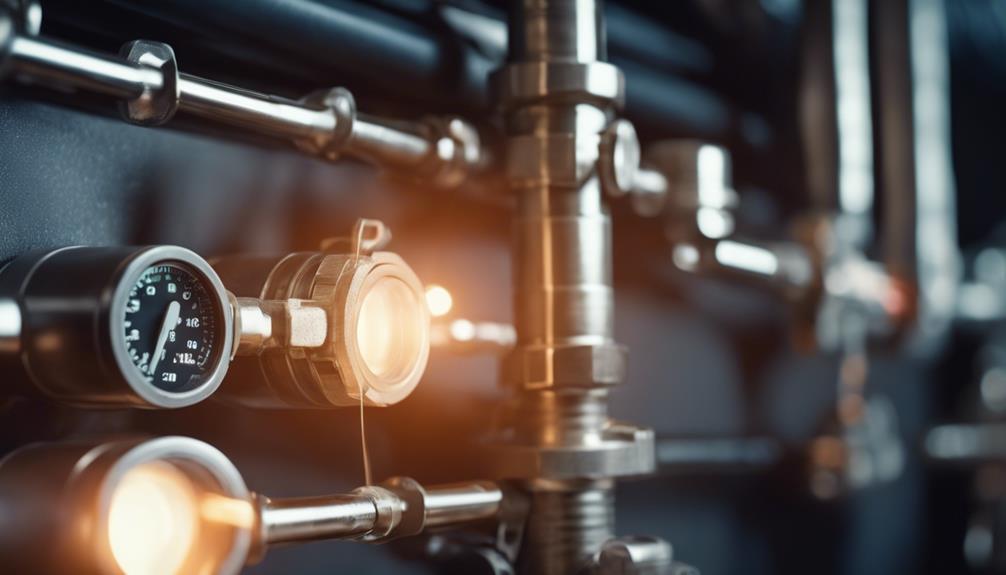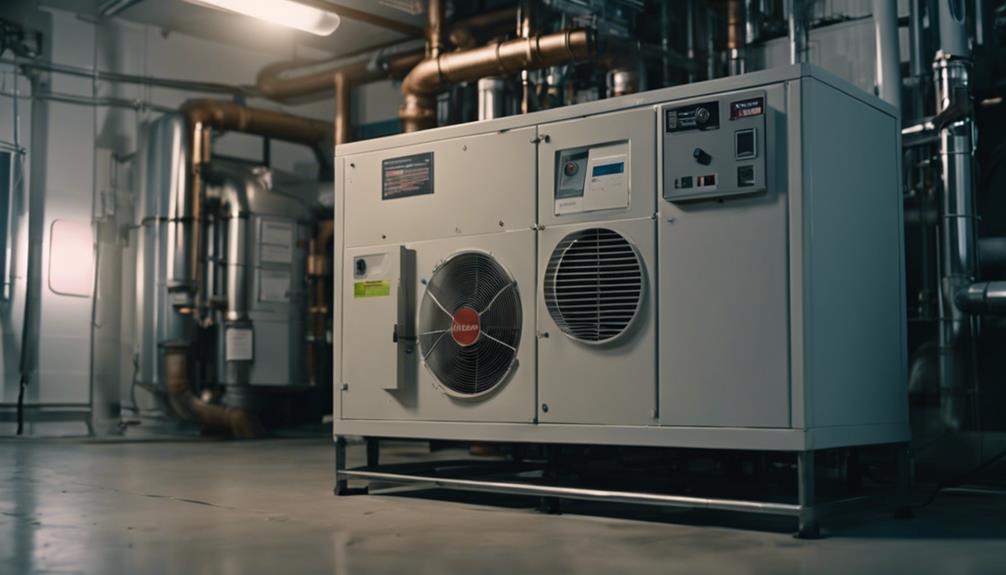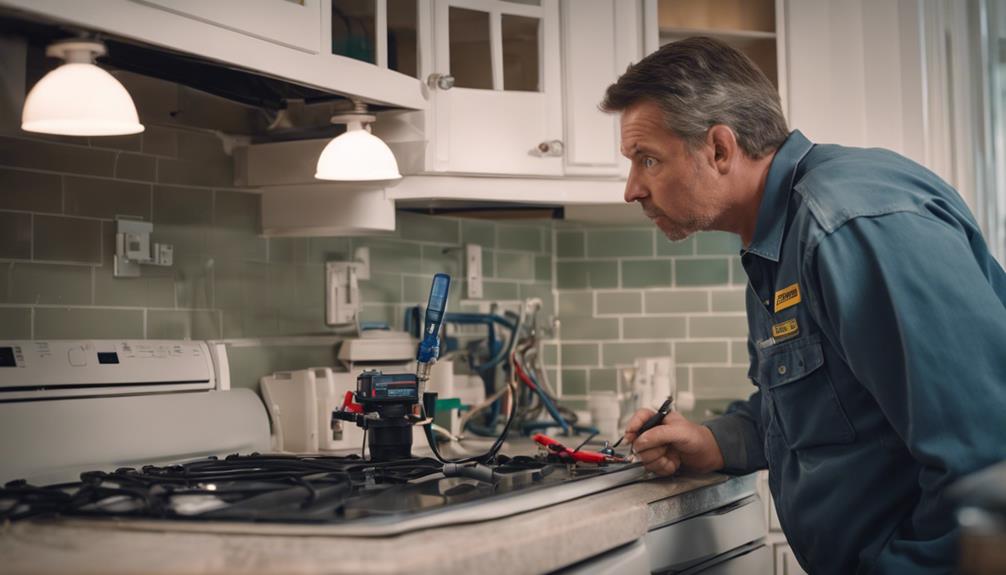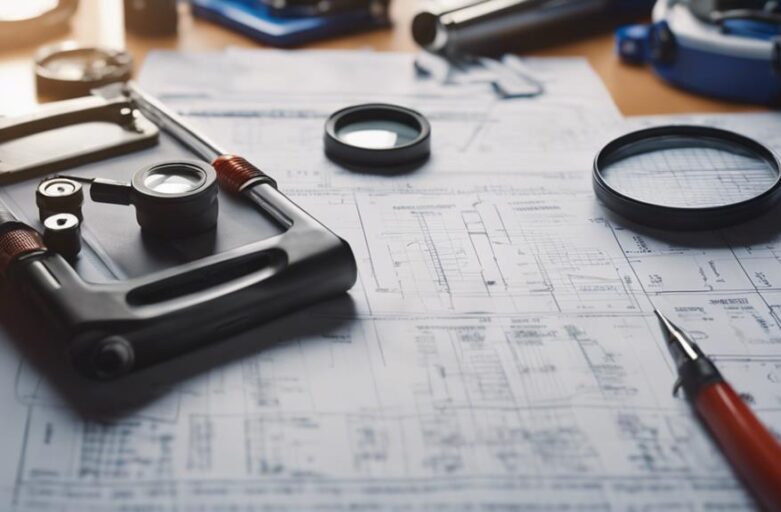To ace your HVAC and plumbing check-up, be a go-getter! First, book a date with a professional for your inspection. Make sure they can easily reach your systems by removing any obstacles. Keep your systems in top shape by regularly cleaning outdoor units and swapping out old filters. If you spot any leaks, fix them up.
Make sure your house is getting the right amount of fresh air. Talk to your inspector and ask questions to understand better. Be present and involved during the inspection because it's your house. Keep learning and you'll know how to keep everything working great.
Key Takeaways
- Plan a yearly check-up for your heating and cooling systems, as well as your pipes, before it gets too cold or hot.
- Make sure there's a clear path to your heating, cooling, and pipe systems so the inspection can go smoothly.
- Do simple upkeep tasks, like swapping out dirty air filters, tidying up outside units, and examining drain lines.
- Find and fix any leaks in your pipes to save water and avoid damage.
- Keep your home well-ventilated to keep the air fresh and stop mold from growing.
Scheduling the Inspection
Setting up your heating, ventilation, and air conditioning (HVAC) and plumbing checks is very important. This helps make sure your systems are working their best all year. Plus, if there are any problems, they can be fixed before bad weather starts. This makes your home a cozy place where you feel safe no matter what's happening outside.
You should plan these checks once a year with a professional technician. This person is like your team mate, helping you understand the complicated world of HVAC and plumbing systems. They'll make sure everything is working the way it should, so your house is ready for any season.
It's very important to plan these checks ahead of time. Doing this lets any needed fixes or upkeep be done before harsh weather. It also gives you time to get ready for the check in any special ways you need to. Remember, this isn't just something to cross off a list. It's about taking good care of your home. It's about feeling like you're part of a community. And it all starts with a phone call or an email to set up that important check. So, don't put it off. Schedule your HVAC and plumbing checks today.
Clearing Access to Systems
Let's talk about making room for your heating, cooling, and plumbing systems. This means getting rid of any mess or stuff that's in the way of your vents and equipment. This step is super important because it helps make checks and repairs happen faster and easier.
Think about a repair person trying to get around a bunch of boxes or plants to get to your heating or cooling system. It takes extra time and it's not safe. Making enough room helps keep things safe, avoids delays, and helps find problems quickly.
Here's a table to help explain why this step is important:
| What You Do | Why It's Good | What It Does |
|---|---|---|
| Get rid of mess | Makes repairs easier | Saves time |
| Take away things in the way | Keeps repair person safe | Lowers risk |
| Make enough room | Helps check system well | Improves upkeep |
Routine Maintenance Tasks

After you've made sure you're able to reach your systems, it's vital to keep doing regular upkeep jobs. This will ensure your heating, ventilation, and air conditioning (HVAC) and plumbing systems work well and don't waste energy.
Let's start with your HVAC air filters. These important items should be replaced every 1-3 months. They help maintain clean air in your home and help your system perform at the highest level. Then, look at your outdoor HVAC units. Make sure to regularly remove any debris from around them to allow free airflow.
Next, check out condensate drain lines. Regular checks and cleaning are important. You don't want water damage or mold because of blocked lines. Also, make sure to frequently check your plumbing fixtures. Fixing small issues quickly can prevent bigger problems in the future.
One more thing – thermostat settings. Make sure they're set correctly to control your home's temperature accurately. This simple action can help save money and keep your home comfy.
Doing these jobs won't only get you ready for an inspection but also help your systems last longer. Remember, it's always better to prevent problems than to fix them. So, get started today!
Leak Check and Repair
Let's dive into the important job of finding and fixing leaks.
You need to be a detective to find these hidden leaks and know how to patch them up properly.
This isn't just about not wasting water; it's also about keeping your house safe from things like mold and damage to the building.
Plus, doing this helps your heating and cooling systems work better.
Identifying Common Leaks
Common leaks such as faucets that drip, pipes that leak, and toilets that run non-stop can happen in your home without you noticing. They can waste a lot of water. For example, just one faucet that drips can waste hundreds of gallons in a year.
To catch these leaks early, keep an eye on your water meter when you're not using any water. Fixing leaks quickly is vital to prevent serious water damage and the growth of mold, which can be harmful to your health.
A tiny leak now can cause a lot of harm later. So, it's important to take care of your home and keep your plumbing working well!
Effective Repair Techniques
Once you've found those annoying leaks, it's time to put on your work gloves and fix them! By fixing leaks quickly, you can avoid water damage and lower your bills.
It's vital to know different ways to fix leaks, like using caulking, epoxy, pipe wraps, or soldering. Each method is used for a specific type of leak repair.
When you get your HVAC and plumbing checked, expert plumbers might use fancy tools for finding and fixing leaks accurately. Remember, you're not doing this alone. You're part of a team that truly wants to keep our homes and world safe.
As you work on finding and fixing leaks, remember you're not just stopping a leak; you're helping save important resources for our future.
Ensuring Proper Ventilation

Proper ventilation is really important, and it's not just to keep the house smelling nice. It's about keeping us healthy and saving cash too.
When our ventilation system works as it should, we've less moisture around. This means the chance of getting mold is lower. Plus, we can also save on our energy bills.
Let's make sure our ventilation system is working right so we can feel comfy at home.
Ventilation System Basics
Ventilation systems are like the superheroes of air quality in our homes. They do important jobs like controlling how moist our air is, which stops icky things like mold from growing. These systems also help fresh air move around our homes, getting rid of old air and any nasty stuff in it. This makes the air in our homes cleaner and healthier to breathe.
Good ventilation is like the secret ingredient to a healthier home. It's not just about being comfy, it's about taking care of our lungs. These systems help to keep our homes healthy by lowering the chances of us having breathing problems. Remember, having a well-ventilated home isn't just something nice to have, it's something we need. So, let's appreciate what ventilation does for us and aim to understand how it works. This will help us be ready for any HVAC checks.
Maintaining Adequate Ventilation
Each breath you take at home counts. It's really important to make sure your home's ventilation system is working right. This helps keep the air inside your home clean and stops mold from growing. Good ventilation can keep your home from being full of stuff that might harm your health. It can also make your home a nicer place to live.
Remember to check your ventilation system often and fix any problems right away. Don't forget to clean it regularly too. This won't only help your system last longer but also make your home healthier. Your home's ventilation is more than just about being comfortable. It's about keeping you healthy too.
Communicating With the Inspector
Talking with the inspector is really important. You need to tell them everything about your heating, ventilation, and air conditioning (HVAC) and plumbing systems. Just like how you wouldn't hide a bad grade from your parents, don't hide any problems you've noticed from the inspector. They're here to help.
The inspector might ask how old your systems are and when you last had them checked or repaired. Think of it like a doctor's visit, but for your house. You need to tell them when you last saw a doctor (maintenance) and if you've had any surgeries (repairs) recently.
Have you made any recent changes to your systems? If yes, tell the inspector. It's like telling your teacher about a cool new book you read over the summer. It could change the way they think about and grade your 'assignment'. Inspectors are super smart and experienced, they've seen lots of different houses and systems, so there's no need to worry about surprising them. They just want to make sure everything in your house is safe and working right.
Before the inspector leaves, ask them for any advice on how to take care of your HVAC and plumbing systems. It's like asking your teacher for study tips; they've a lot of knowledge to share. If you listen to their advice, your systems will work better and last longer, making your house a nicer place to live.
Being Present During Inspection

Being part of your home's HVAC and plumbing inspection is more than just watching. It's about learning and understanding how everything works. You get to ask questions and find out what needs to be done to keep things running smoothly.
You aren't just standing there; you're getting involved. You get to see how your systems work and you won't be left wondering what's going on.
Don't be scared to ask questions. The inspection is the perfect time to find out how to look after your systems in the best way. The inspector isn't just there to find problems; they're there to give advice on how to make your systems last longer.
Being there for the inspection shows you care about your home and want to look after it. It's not just about finding problems right now, it's about learning how to stop them from happening later. So, be there, get involved, and learn how to keep your home in great shape.
Conclusion
Ready to pass your HVAC and plumbing inspection with flying colors? Here's a simple guide that'll make it a piece of cake!
First, make sure you've booked your inspection. Next, make sure the inspector can easily get to your HVAC and plumbing systems – no boxes or furniture in the way. After that, do a quick check-up on your systems to make sure they're working well.
Don't forget to look for leaks. Even tiny ones can be a big problem! Make sure there's plenty of fresh air around your systems, too. That's called proper ventilation.
Talk to your inspector before the big day and make sure you're there for the inspection. This shows you're serious about keeping your home safe and efficient.
Remember, being prepared is the secret to success. Follow these seven simple steps and you'll pass your inspection without any hiccups. Remember, you've got this!


